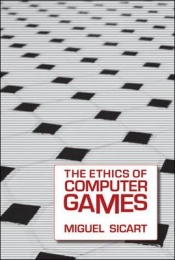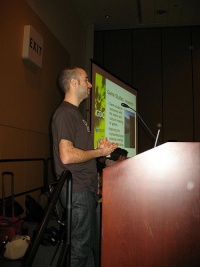Miguel Sicart
| Birthname | Miguel Sicart |
| Date of Birth | March 26, 1972 |
| Birth Place | Esbjerg, Denmark |
| Nationality | Danish |
| Occupation | Researcher of Ethics in Gameplay |
| Biography | PhD in Game Studies Book Banality of Simulated Evil Professor of Game Design Speaker |
M iguel Sicart (Born March 26, 1972 in Esbjerg, Denmark) is, as he self-reports on his own website, a researcher interested in computer games and ethics, game design, art, and other related topics. He is a prominent figure in the field of computer games and Information Ethics, and has authored numerous publications on the topic. He is also a widely sought after speaker, as he has given countless presentations and spoke at many conferences in the past five years.
|
Contents
Education and Career
Miguel Sicart received his PhD in Game Studies in 2006 and now, as an Assistant Professor and the Head of the Media Technology and Games Program at the IT University of Copenhagen, he teaches game design at the Center for Computer Games Research. His current work consists of researching and developing a design framework for applying ethical gameplay in digital environments.
Major Contributions
Sicart uses a multidisciplinary method to research, understand, and explain issues in ethics and information/gaming technology. He has studied and written about game design, video games, violence, as well as the function of age-regulation codes.
Two works that have stood out in the field of Information Ethics and Technology are Sicart’s 2009 article titled "The Banality of Simulated Evil: Designing Ethical Gameplay”[1] and his 2005 article “Game, Player, Ethics: A Virtue Ethics Approach to Computer Games”.[2] In “The Banality of Simulated Evil”, Sicart argues that video games have to be developed with ethical considerations at their core if they are to promote any kind of ethical gameplay available for the player to take part in. This is an interesting stance he takes because some researchers in the field argue that it is all up to the individual to make ethical decisions, and that the game has no responsibility of its own to be moral, let alone offer any morally conscious options for the player to choose while participating in its environment.
Furthermore, Sicart takes a novel stance on the ethics of gameplay in his 2005 article “Game, Player, Ethics”. He argues that a great deal of ethical responsibility is placed on the player him/herself when engaging in a digital game; the player must be conscious of how his/her actions affect the game, and want to make ethical decisions if there are to be any morals present in the game. The evolution of this argument for player responsibility appears in the 2009 paper, "The banality of simulated evil: designing ethical gameplay".
In his 2009 paper, Sicart acknowledges the individual players’ role in promoting Ethics in computer games and adds a new layer of complexity. The author argues that players must consider the ethical implications of their decisions within a virtual environment and bear the responsibility for the consequences of their actions. If ethical outcomes are to be considered a possibility within the virtual space, the game itself has to provide the option of making these decisions. In large part, the code determines whether or a not a player is able to have any ethical autonomy within the game: if the only way to succeed within a game is by engaging in unethical behavior, a player is reduced to following the unspoken law of the code OR giving up gameplay entirely. If games are to represent a new frontier for expressing moral action, a certain amount of autonomy (and consequentially, a modicum of accountability) is absolutely necessary.
Sicart’s major contribution to the field of Information Ethics and Technology is how skillfully he acknowledges and incorporates all facets of the gaming environment, from the players to the game designers to the game itself, into the solution of creating more ethical gaming environments. He is considered by the community one of the few researchers at this time that is willing to “point the finger” in multiple directions and require action from all involved parties concerning digital games and the necessity of having ethical gameplay within these environments.
Publications
Books
- The Ethics of Computer Games by MIT Press[1]
Articles
- Family Values: Ideology, Computer Games and The Sims, Digital Games Research Association conference, Utrecht, The Netherlands, November 2003
- Take the Money and Run? An Ethical Approach to the Relation Between Game Reseach and Game Industry, in Rauterberg, Matthias (ed.), Entertainment Computing – ICEC 2004, Proceedings, pages 163 – 167
- The Ethics of Computer Game Design, Digital Games Research Association Conference, Vancouver, Canada, June 2005
- Game, Player, Ethics: A Virtue Ethics Approach to Computer Games, in International Review of Information Ethics, 4, December 2005
- “Two perspectives on the ethics of computer games”, in Øhrstrøm, Peter & Albert Albrechtslund (eds.), IT-Etik. En antologi om informations-og kommunikationsteknologiske emner I etisk belysning, Aalborg University Press, 2007
- Newsgames: Theory and Design,in Entertainment Computing – ICEC 2008, Lecture Notes in Computer Science, November 2009
- How I Learned to Love the Bomb: Defcon and the ethics of computer games, in Entertainment Computing – ICEC 2008, Lecture Notes in Computer Science, November 2009
- Defining Game Mechanics. Game Studies Vol. 8, Issue 2, December 2008[2]
- Beyond Choices: A Typology of Ethical Computer Game Designs, International Journal of Gaming and Computer-Mediated Simulations, Vol. 1, Nr. 3, July-September 2009
- The Banality of Simulated Evil: Designing Ethical Gameplay, Forthcoming in Ethics and Information Technology. 2009
- The Ethics of Computer Games, Cambridge, Mass.: The MIT Press. 2009
- A Flourishing Revolt, in Cuddy, Luke and John Nordlinger (eds.), World of Warcraft and Philosophy. Chicago: Open Court.
- This War is a Lie: World of Warcraft and Ethics, in Wankel, Charles and Shaun Malleck (eds.), Emerging Ethical Issues of Life in Virtual Worlds. Charlotte, NC.: Information Age Publishing
To see a pdf version of this list from the IT University of Copenhagen, please click here
Upcoming Works
- Values Between Systems: Designing Ethical Gameplay, in Schrier, Karen and David Gibson (eds.), Ethics and Game Design: Teaching Values Through Play. IGI Publishing (Publi Date: March 15, 2010).
Conferences and Presentations
Conferences
Presentations
- Games, Public Services, and Ethics (Gaming for the People, IT University of Copenhagen) 2005
- Ethical Players, Unethical Designs (Nordic Game, Malmø) 2006
- Ethical Gameplay Design: A Next-Gen Challenge (presented for the Level Designers group at IO Interactive, Copenhagen) 2008
- Newsgames: Theory and Design (presented at ICEC) 2008
- How I Learned to Love the Bomb: Defcon and the Ethics of Computer Games (presented at ICEC) 2008
- Beyond Choices: A Typology of Ethical Computer Game Designs (presented at Meaningful Play) 2008
- No More Homo Ludens: Designing for an Ethical Player, Keynote Lecture, The Philosophy of Games Conference, Oslo (Norway) 2009
- Not to Choose: Designing Ethical Gameplay, Keynote Lecture, MindTrek conference, Tampere (Finland) 2009
External Links
- Miguel Sicart's Personal Home Page
- Miguel Sicart's contact page at the IT University of Copenhagen
- Miguel Sicart's Publication List
- Sicart's Twitter Page
- List of speakers and short bios, including Sicart's, who presented at the Nordic Game Conference in 2009
- "Playing Columbine" at the Internet Movie Data Base
- "Playing Columbine" Casting Page
- Sicart's session description for GDC 2009
References
- ↑ Sicart, Michael · (date) · The Ethics of Computer Games · work · MIT Press · 04-21-2018
- ↑ media:Sicart+Banality+of+Simulated+Evil+2009.pdf|Sicart, Miguel. The Banality of Simulated Evil: Designing Ethical Gameplay. 2009.




